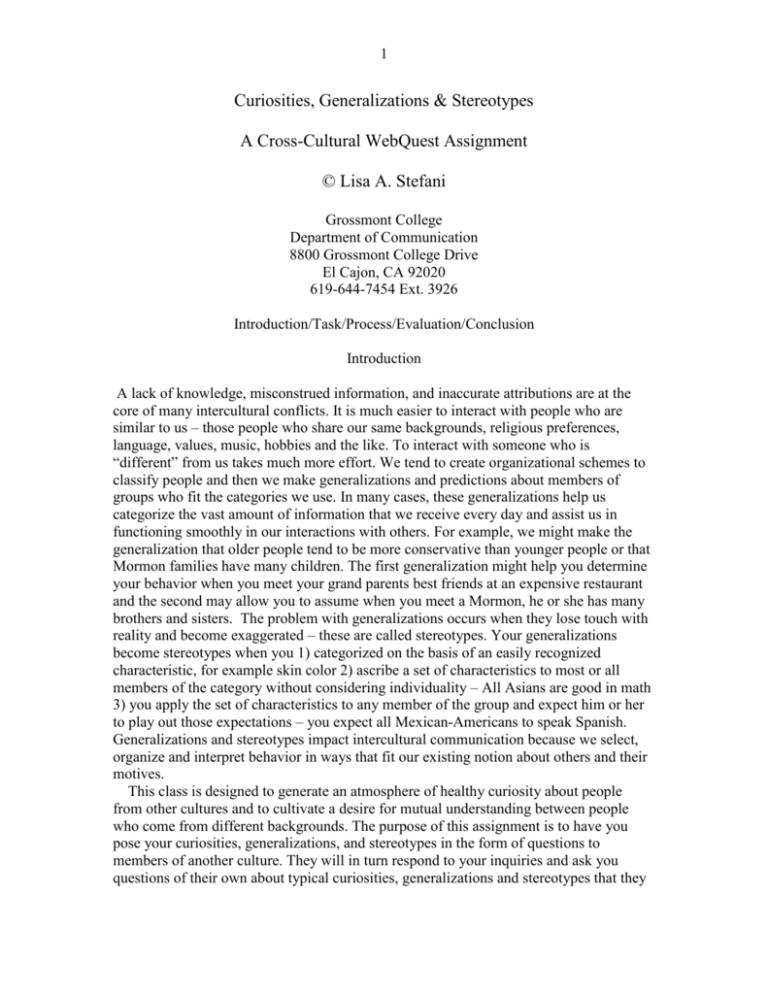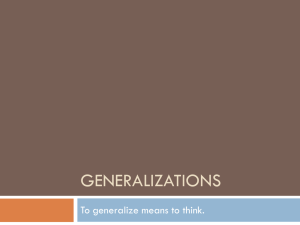Stereotypes Assignment - Global Communication Online
advertisement

1 Curiosities, Generalizations & Stereotypes A Cross-Cultural WebQuest Assignment © Lisa A. Stefani Grossmont College Department of Communication 8800 Grossmont College Drive El Cajon, CA 92020 619-644-7454 Ext. 3926 Introduction/Task/Process/Evaluation/Conclusion Introduction A lack of knowledge, misconstrued information, and inaccurate attributions are at the core of many intercultural conflicts. It is much easier to interact with people who are similar to us – those people who share our same backgrounds, religious preferences, language, values, music, hobbies and the like. To interact with someone who is “different” from us takes much more effort. We tend to create organizational schemes to classify people and then we make generalizations and predictions about members of groups who fit the categories we use. In many cases, these generalizations help us categorize the vast amount of information that we receive every day and assist us in functioning smoothly in our interactions with others. For example, we might make the generalization that older people tend to be more conservative than younger people or that Mormon families have many children. The first generalization might help you determine your behavior when you meet your grand parents best friends at an expensive restaurant and the second may allow you to assume when you meet a Mormon, he or she has many brothers and sisters. The problem with generalizations occurs when they lose touch with reality and become exaggerated – these are called stereotypes. Your generalizations become stereotypes when you 1) categorized on the basis of an easily recognized characteristic, for example skin color 2) ascribe a set of characteristics to most or all members of the category without considering individuality – All Asians are good in math 3) you apply the set of characteristics to any member of the group and expect him or her to play out those expectations – you expect all Mexican-Americans to speak Spanish. Generalizations and stereotypes impact intercultural communication because we select, organize and interpret behavior in ways that fit our existing notion about others and their motives. This class is designed to generate an atmosphere of healthy curiosity about people from other cultures and to cultivate a desire for mutual understanding between people who come from different backgrounds. The purpose of this assignment is to have you pose your curiosities, generalizations, and stereotypes in the form of questions to members of another culture. They will in turn respond to your inquiries and ask you questions of their own about typical curiosities, generalizations and stereotypes that they 2 hold of Americans. This exploration will help us to see that all of our perceptions regarding others are not necessarily accurate. In addition, it will help us better understand the behaviors and actions of people in a different country. The Task Your assigned cultures are: Spring 2015: Belize (Note: If you are not familiar enough with the country you have been assigned, use one of the web links in the workbook or Google the country and read about it.) Think about some of the curiosities, generalizations, and stereotypes of the culture you have been assigned. For instance if you were assigned the Japanese culture, you might hold a generalization that all Japanese shuffle their feet when they walk so you might ask, “Why do Japanese people shuffle their feet when they walk?” Perhaps you might ask, “Why do Japanese cover their mouths when they laugh?” “Why do Japanese people speak so quietly?” Select two of these curiosities, generalizations, and stereotypes that you thought of and pose them as questions. These questions should be genuine, polite, but not necessarily “politically correct.” That is to say, if there is something you would really like to know, or a generalization that you hold, but you are not sure if it is appropriate to ask, think carefully about wording your question in a polite way. For example, a Japanese student might wonder why so many Americans are “Fat.” Instead of asking, “Why are Americans so fat?” he or she might say instead, “I have noticed that many Americans are overweight. Can you tell me why this is?” An American student might wonder why many Japanese have crooked teeth. Instead, they may say, “I have noticed that not many Japanese have worn, or wear braces on their teeth. Is there a reason for this?” The goal here is to check your generalization or stereotypical perception for clarification. Once you have generated two good questions, you will post them on the bulletin board per the directions in the process section. The Process Your Professor will e-mail the class listserv notifying them of the bulletin board thread that has been assigned to each specific class. Please be sure to post on your classes thread only in order to eliminate confusion when several classes are participating in the assignment. Forming Questions (Check Calendar of Assignments for Due dates) 1) Begin by conducting some research on Belize. After you have researched thoroughly, examine your own curiosities, generalizations, and stereotypes about your assigned culture and write these down. 2) Turn these into questions (Check Calendar of Assignments to determine how many questions you need to submit) as noted in the Task section of this assignment. You will need to provide a rationale for your question, in other words, what information caused you to ask this question, and where did you get the information that led you to form the question/stereotype. Be sure to include the hyperlink so your cross-cultural colleague can read the same material that you did to create the question. Spell and grammar check. 3 3) Post your questions on the Bulletin Board (Directions and passwords included in the e-mail notification of this assignment)(Also, be sure you have read the Bulletin Board section under “Getting Started” as there is a “Listening Test” there that you don’t want to miss). E-mail a copy to the Professor on the due date with the correct subject line indicated on the Calendar of Assignments. Answering Questions (Check Calendar of Assignments for Due Dates) 1) Your colleagues in the assigned culture have been given this same assignment and they will be posting questions on the Bulletin Board for you to respond to. 2) Select questions (Check the Calendar of Assignments to determine how many questions you need to submit) from the students in your assigned culture. Your response to each question you answer will have three parts: a) Your own thoughts, opinions, beliefs and experience regarding the question b) Research you did to support your answer c) The web link from your research so your cross-cultural colleague can do further reading on the topic. 3) After you have spell and grammar checked your responses, post them on the Bulletin Board itself by clicking “response” in the thread the question is in. Be sure to put your full name on the response so that you will receive credit for it. For example, John Smith responding to Silvaana Woods question on American Obesity. E-mail a copy to the Professor on the due date with the correct subject line indicated on the Calendar of Assignments). Evaluation Your grade for this assignment will be evaluated according to the following criteria: 1) Did you produce the correct number of questions that were thought provoking and worded politely? 2) Did you give a rationale and explanation for why you have that question or hold that belief? 3) Did you cite the references that you used to formulate the questions and rationale? 4) Did you post your questions on the Bulletin Board in the correct location without starting new threads? Did you e-mail a copy to the Professor? 10 % of your grade is based on these four items 5) Did you respond to the correct number of questions posted on the Bulletin Board by the students in your assigned culture? 6) Were your responses detailed or were they one-line responses? 7) Did you include your own personal thoughts, beliefs, opinions and experience on the topic? Did you include the research you based your answer on? Did you include web links for further reading and research regarding your answer? 8) Did you post your responses in the correct location on the BB? Did you e-mail a copy to the Professor? 10% of your grade is based on these four items 4 Conclusion If we are going to communicate with people on a Global scale, it is important for us to recognize our cultural generalizations and stereotypes. It is a good idea to check these perceptions for accuracy or inaccuracy if the opportunity presents itself. In exploring our perceptions of the students in the assigned cultures and responding to their perceptions of us, we can better understand each other, develop our global friendships, and make more accurate predictions about the communication patterns and behaviors of members in the other culture while at the same time considering people as individuals.







